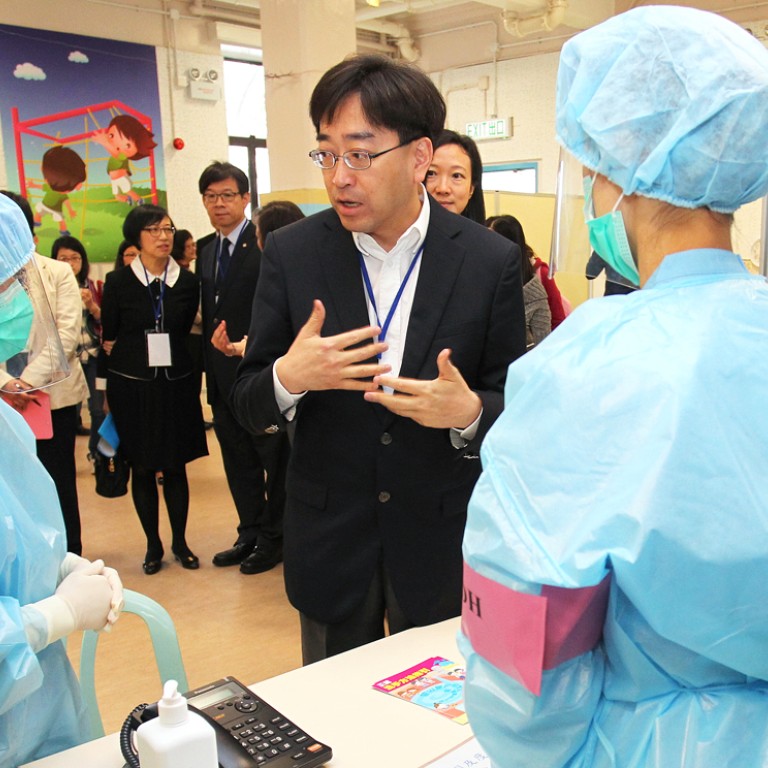
Hong Kong private health insurance plan 'will help 1.5 million people'
Government unveils long-awaited scheme intended to ease the burden on public hospitals and push more patients to the private sector
The government expects about 1.5 million people to benefit from a long-awaited voluntary health insurance scheme which will cost the public purse HK$256 million in tax rebates a year and HK$4.3 billion in subsidies for high-risk patients over a 25-year period.
Under the reforms, all private health insurance policies will have to meet 12 criteria set by the government. Insurers will have to offer a so-called standard plan for which even people with pre-existing conditions will be guaranteed acceptance.
But premiums for all policies would rise by about 9 per cent to an average of HK$3,600 per year, according to projections by the Food and Health Bureau.
The shake-up is the latest weapon in the battle to encourage patients to swap from the stretched public sector - which treats 90 per cent of patients but employs only 40 per cent of doctors - to private hospitals. A three-month consultation was launched yesterday, and it could be up and running by 2016 if passed by the Legislative Council.
The government will pump in HK$4.3 billion to help pay for treatment for about 70,000 "high-risk" patients. People who take out policies will also receive unspecified tax breaks, expected to cost HK$256 million per year.
"This will help to relieve pressure on the public system, and users of public health care services can benefit from shorter waiting times and enhanced service quality," health minister Dr Ko Wing-man said.
The idea of publicly backed medical insurance was mooted in 2008 and has been revived as the city grapples with the challenge of an ageing population.
Private Hospitals Association chairman Dr Anthony Lee Kai-yiu said the plan would aid both the public and private sectors.
But the insurance industry was concerned that the tax incentive would not encourage new buyers to take out insurance.
Chan Kin-por, lawmaker for the sector, said the plan compared poorly with an idea from the previous government to subsidise a 30 per cent discount on premiums for new buyers.
"The tax incentive will save most Hongkongers a few hundred dollars, but a 30 per cent discount on HK$3,600 will save more than HK$1,000," Chan said.
Estimates by the , based on the government's preliminary figures, suggest the tax rebate would come to between HK$20 and HK$400 per person, with a further subsidy for dependants.
The minimum standards would force insurers to provide HK$650 per day for hospital stays of up to 180 days, HK$58,000 per surgery and HK$150,000 for cancer treatments such as chemotherapy and radiotherapy. There will be no limits on lifetime benefits, and rules on premium levels and underwriting. Insurers will also be able to offer enhanced packages which go beyond the minimum, for which there would be no guaranteed acceptance.
The beneficiaries will include an estimated 80 per cent of the 1.5 million Hongkongers with private insurance, whom the government expects to switch to the new plans, as well as an expected 200,000 or more new customers. As many of the newcomers will have chronic conditions, the government expects about 5 per cent of medical procedures from public hospitals to be diverted to the private sector, saving it HK$2.8 billion per year.
The minimum standard will not apply to group insurance, bought by employers for staff.
The reform also includes rules for private health providers, backed by fines of up to HK$1 million and jail sentences of up to two years. They will also have to offer more transparent prices.
An earlier version of the story said the the voluntary health insurance scheme which will cost the public HK$4.5 billion a year. It should be "HK$256 million in tax rebates a year and HK$4.3 billion in subsidies for high-risk patients over a 25-year period."
The standard package
Average standard premium for proposed standard plan*: HK$3,600 per year (estimated)
Protection
- Guaranteed renewal with no re-underwriting
- No lifetime benefit limit
- Guaranteed acceptance for all ages within the first year of the scheme being implemented
Coverage conditions
- Hospital admission: HK$650 per day for up to 180 days
- Attending physician visit of HK$750 per day for up to 180 days
- A limit of HK$58,000 per operation (varies by surgery type)
- Non-surgical cancer treatment (such as radiotherapy or chemotherapy) of up to HK$150,000 per case
- Advanced diagnostic imaging tests, such as MRI, CT and PET scans in a package benefit (amount subject to consultation)
Company insurance
- No need to fulfil the minimum requirement
- Employees can switch to individual standard plan upon leaving employment or retirement
Tax break
- Tax deductions for taxpayers who insure themselves and their dependants (level subject to financial secretary’s decision)
* subject to age group; estimate based on 2012 market price
Source: Food and Health Bureau



